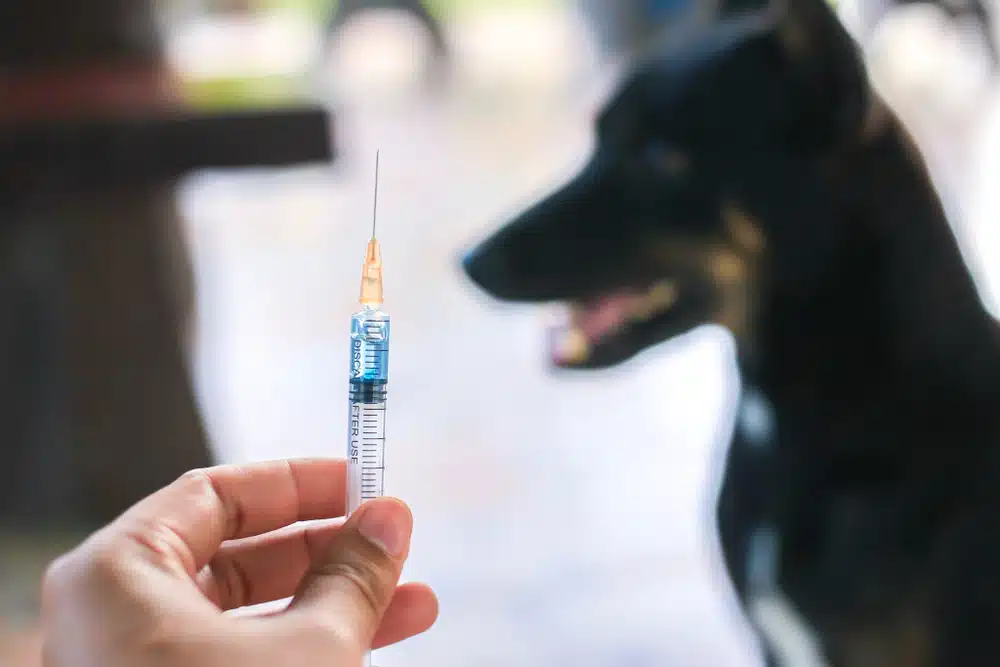When you receive your pet’s vaccination reminders, you may question which diseases the shots are preventing your pet from contracting. How serious are these diseases? Does my pet really need all these vaccinations? Our Animal Hospital of Parkland team answers these questions and more as we explain how your furry pal’s vaccinations work to keep them safe.
What is the difference between core and non-core vaccinations for pets?
All dogs and cats should receive all core vaccinations, as the diseases they protect against are serious contagious illnesses. In addition, your veterinarian will strongly advise you to ensure your pet receives specific non-core vaccinations, which are recommended based on your furry pal’s lifestyle, exposure risk, geographic location, and overall health.
For example, all dogs and cats should receive the rabies vaccination. Through their blood or saliva, an infected animal can transmit this deadly condition to any mammal. Typically, a rabid animal’s bite spreads the disease to another animal or human, which results in neurologic issues that eventually cause death. Fortunately, laws requiring all pets to receive rabies vaccinations have virtually eliminated this disease in the United States.
Vaccination protection for dogs
Because most dogs generally go outside for exercise and bathroom breaks, they are exposed to a range of infectious diseases that other dogs or wildlife may carry. Core vaccinations are designed to protect your canine companion against many of these serious illnesses. Core canine vaccinations include:
- Canine distemper — Highly contagious—but rare because of excellent vaccination protocols—distemper can be fatal. This virus affects multiple body systems, causing signs such as fever, eye and nasal discharge, vomiting, diarrhea, nose and foot pad thickening, pneumonia, and neurologic issues. If an affected dog manages to pull through this devastating disease, they will likely experience lifelong effects such as seizures or muscle twitching.
- Canine parvovirus — Parvovirus is a highly contagious virus that attacks rapidly dividing cells within the body, such as those in the gastrointestinal tract and bone marrow. Young puppies and unvaccinated dogs are most at risk, and can develop fever and lethargy that quickly progresses to—often bloody—vomiting and diarrhea. Despite intensive supportive care, puppies with parvovirus may succumb to this deadly disease.
- Canine adenovirus — Vaccinating your dog for canine adenovirus protects against both types 1 and 2, which—depending on the strain—can cause liver failure or tracheobronchitis. Canine adenovirus type 1 (i.e., canine infectious hepatitis) signs include fever, abdominal pain, vomiting, and diarrhea. Canine adenovirus type 2 signs include a hacking cough, sneezing, and pneumonia.
- Parainfluenza — A virus included in the canine infectious respiratory disease complex (i.e., kennel cough), parainfluenza causes a highly contagious respiratory infection that typically resolves on its own. However, parainfluenza can develop further into pneumonia or more severe respiratory disease.
Your veterinarian may advise that your dog receive non-core vaccinations based on their exposure risk. Canine non-core vaccinations include:
- Leptospirosis
- Canine influenza
- Lyme disease
- Bordetella bronchiseptica (i.e., kennel cough)
Vaccination protection for cats
Although cats typically spend most, if not all, their time safely confined indoors, they remain at risk for contracting infectious diseases. If you welcome a stray cat into your home, pet unfamiliar or unvaccinated cats, or visit an animal shelter, you can spread pathogens, so your indoor-only cat still needs protection through regular vaccination. Core feline vaccinations include:
- Feline calicivirus — A major cause for upper respiratory infections in cats, calicivirus is highly contagious. Depending on the viral strain, signs can range from mild to severe, and include fever, oral ulcers, and pneumonia. After recovery, a cat can become a carrier—having the ability to infect other cats—in addition to experiencing chronic sneezing, watery eyes, and severe gingivitis.
- Feline viral rhinotracheitis — Similar to the human common cold, this virus causes upper respiratory infections and is easily transmitted among cats. Affected cats can develop a fever, appetite loss, sneezing, and eye and nasal discharge. As with feline calicivirus, once infected, a cat can remain a carrier for life.
- Feline panleukopenia — Panleukopenia in cats appears similar to parvovirus in dogs, and is often fatal, particularly in young, unvaccinated kittens. Signs include lethargy, diarrhea, vomiting, severe dehydration, and fever. Fortunately, vaccination is highly effective, as successful treatment is often difficult.
- Feline leukemia virus (FeLV) for cats younger than 1 year of age — FeLV destroys your cat’s immune system, and they go on to experience a multitude of serious health issues. Without a fully functioning immune system, your cat can develop bacterial and viral infections more easily, and they are also more likely to develop cancer. Cats who contract feline leukemia often show no signs for months or years after the initial infection, but eventually their failing immune system takes its toll, and they begin developing secondary infections. Feline leukemia is spread through mutual grooming, bite wounds, and from mother to kittens. The disease can also be spread through shared food bowls and litter boxes. However, FeLV is rarely transmitted in this manner.

Your veterinarian may advise that your cat receive non-core vaccinations based on their exposure risk. Feline non-core vaccinations include:
- Feline leukemia virus for cats older than 1 year of age
- Chlamydophila felis
- Bordetella bronchiseptica
Vaccinations are essential for protecting your pet and your family members from infectious diseases. Many diseases your pet may contract are zoonotic, meaning they can be transmitted from animals to people. Protect yourself and your furry pal by keeping them current on their vaccinations. Contact our Animal Hospital of Parkland team to schedule an appointment.

